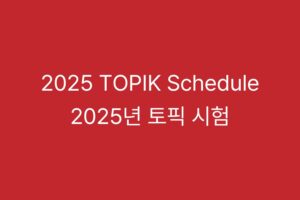
Welcome, TOPIK II candidates! Achieving a high score in the Test of Proficiency in Korean (TOPIK) is a significant milestone that validates your advanced Korean language skills. A crucial part of your success in the TOPIK II exam lies in mastering the essential vocabulary(topik 2 words) that frequently appears in the test. In this blog post, “Essential TOPIK 2 Words: Key Vocabulary for the Exam – 1,” we aim to equip you with the necessary words and effective strategies to bolster your exam preparation.
Before delving deeper into the vocabulary for TOPIK II, it’s beneficial to build on a solid foundation, which is why we recommend exploring our previous post, “Introduction to Essential TOPIK 1 Vocabulary.” This article covers the basic words that form the groundwork for the advanced vocabulary needed for TOPIK II.
Let’s embark on this enriching journey together, expanding your vocabulary and bringing you one step closer to achieving your TOPIK goals. Let’s get started on enhancing your TOPIK listening skills!

The TOPIK II exam is designed to assess intermediate to advanced levels of Korean language proficiency, covering a wide array of topics from everyday life to academic and professional situations. It consists of listening, reading, and writing sections, each demanding a comprehensive understanding of a broad spectrum of vocabulary. Success in TOPIK II hinges on your ability to navigate complex linguistic landscapes, making an extensive vocabulary an indispensable part of your preparation.

To excel in the TOPIK II exam, familiarize yourself with the following key vocabulary categories that are frequently tested:
< Essential topik 2 words 150 >
| Level | Words | – | Part of speech |
|---|---|---|---|
| 중급 | 가까이 | 가까이 다가오다 | 부사/명사 |
| 중급 | 가꾸다 | 나무를 가꾸다 | 동사 |
| 중급 | 가능성 | 이 높다 | 명사 |
| 중급 | 가득하다01 | 물이 | 형용사 |
| 중급 | 가득히 | 물을 가득히 따르다 | 부사 |
| 중급 | 가리다02 | 얼굴을 | 동사 |
| 중급 | 가만히 | 가만히 두다 | 부사 |
| 중급 | 가스레인지 | 를 켜다 | 명사 |
| 중급 | 가입 | 을 권유하다 | 명사 |
| 중급 | 가정06 | 을 이루다 | 명사 |
| 중급 | 가정07 | 을 해 보다 | 명사 |
| 중급 | 가짜 | 로 꾸미다 | 명사 |
| 중급 | 가치06 | 가 높다 | 명사 |
| 중급 | 가치관 | 이 바뀌다 | 명사 |
| 중급 | 각01 | 각 개인 | 관형사 |
| 중급 | 각자02 | 각자가 맡다 | 명사/부사 |
| 중급 | 각종 | 각종 과일 | 명사 |
| 중급 | -간16 | 이틀간 | 접사 |
| 중급 | 간신히 | 간신히 살아나다 | 부사 |
| 중급 | 간접적 | 간접적 영향 | 관형사·명사 |
| 중급 | 간혹 | 간혹 생기다 | 부사/명사 |
| 중급 | 갈등 | 이 심하다 | 명사 |
| 중급 | 갈수록 | 갈수록 더하다 | 부사 |
| 중급 | -감19 | 책임감 | 접사 |
| 중급 | 감동적 | 감동적 이야기 | 관형사·명사 |
| 중급 | 감히 | 감히 대들다 | 부사 |
| 중급 | 강조02 | 강조 사항 | 명사 |
| 중급 | 개발 | 재능 개발 | 명사 |
| 중급 | 개성03 | 이 강하다 | 명사 |
| 중급 | 개인적 | 개인적 감정 | 관형사·명사 |
| 중급 | 객관적 | 객관적 증거 | 관형사·명사 |
| 중급 | 거꾸로 | 거꾸로 뒤집히다 | 부사 |
| 중급 | 걱정스럽다 | 자식이 | 형용사 |
| 중급 | 건네주다 | 돈을 | 동사 |
| 중급 | 게다가 | 게다가 ~까지 | 부사 |
| 중급 | 겨우 | 겨우 살아나다 | 부사 |
| 중급 | 견디다 | 고통을 | 동사 |
| 중급 | 결국 | 결국 해내다 | 부사/명사 |
| 중급 | 결론02 | 을 내리다 | 명사 |
| 중급 | 결제01 | 카드 결제 | 명사 |
| 중급 | 결코 | 결코 울지 않다 | 부사 |
| 중급 | 경력02 | 을 쌓다 | 명사 |
| 중급 | 경쟁 | 경쟁 상대 | 명사 |
| 중급 | 경쟁력 | 을 키우다 | 명사 |
| 중급 | 경제04 | 경제 개발 | 명사 |
| 중급 | 경제적 | 경제적 능력 | 관형사·명사 |
| 중급 | 경향02 | 새로운 경향 | 명사 |
| 중급 | 계층 | 상류 계층 | 명사 |
| 중급 | 고객04 | 을 맞다 | 명사 |
| 중급 | 고급스럽다 | 자동차가 | 형용사 |
| 중급 | 공적01 | 공적 제도 | 관형사·명사 |
| 중급 | 과소비 | 를 줄이다 | 명사 |
| 중급 | 과연01 | 과연 대단하다 | 부사 |
| 중급 | 과학적 | 과학적 방법 | 관형사·명사 |
| 중급 | 관계없이 | 시간에 관계없이 | 부사 |
| 중급 | 괜히 | 괜히 이야기하다 | 부사 |
| 중급 | 굉장히 | 굉장히 좋아하다 | 부사 |
| 중급 | 구체적 | 구체적 성과 | 관형사·명사 |
| 중급 | 굳이 | 굳이 말하다 | 부사 |
| 중급 | 권리 | 를 누리다 | 명사 |
| 중급 | 규칙적 | 규칙적 생활 | 관형사·명사 |
| 중급 | 그나마 | 그나마 낫다 | 부사 |
| 중급 | 그래프 | 를 그리다 | 명사 |
| 중급 | 그리움 | 을 느끼다 | 명사 |
| 중급 | 그만큼 | 그만큼 남다 | 부사/명사 |
| 중급 | 극히 | 극히 드물다 | 부사 |
| 중급 | 근데01 | 그런데 | 부사 |
| 중급 | 근본적 | 근본적 이유 | 관형사·명사 |
| 중급 | 급격히 | 급격히 감소하다 | 부사 |
| 중급 | 급속히 | 급속히 진행되다 | 부사 |
| 중급 | 급히 | 급히 먹다 | 부사 |
| 중급 | 긍정적 | 긍정적 태도 | 관형사·명사 |
| 중급 | 꾸준히 | 꾸준히 노력하다 | 부사 |
| 중급 | 끊임없이 | 끊임없이 이어지다 | 부사 |
| 중급 | 끝없이 | 끝없이 이어지다 | 부사 |
| 중급 | 나란히 | 나란히 걷다 | 부사 |
| 중급 | 내내01 | 일 년 내내 | 부사 |
| 중급 | 논리적01 | 논리적 사고 | 관형사·명사 |
| 중급 | 늘어나다 | 사람이 | 동사 |
| 중급 | 다만01 | 다만 ~뿐이다 | 부사 |
| 중급 | 단순히 | 단순히 생각하다 | 부사 |
| 중급 | 단지04 | 단지 ~만으로 | 부사 |
| 중급 | 당분간 | 당분간 쉬다 | 명사/부사 |
| 중급 | 당연히01 | 당연히 다르다 | 부사 |
| 중급 | 대개03 | 대개의 경우 | 명사/부사 |
| 중급 | 대기업 | 에 취직하다 | 명사 |
| 중급 | 대도시 | 에 살다 | 명사 |
| 중급 | 대립03 | 이 심하다 | 명사 |
| 중급 | 대책03 | 을 마련하다 | 명사 |
| 중급 | 대통령 | 을 뽑다 | 명사 |
| 중급 | 더욱더 | 더욱더 높아지다 | 부사 |
| 중급 | 도대체 | 도대체 얼마 만이니? | 부사 |
| 중급 | 되게 | 되게 크다 | 부사 |
| 중급 | 되도록 | 되도록 빨리 | 부사 |
| 중급 | 따라서 | − | 부사 |
| 중급 | 때때로 | 때때로 변하다 | 부사 |
| 중급 | 또한 | 나 또한 | 부사 |
| 중급 | 많아지다 | 나이가 | 동사 |
| 중급 | 맘대로 | 맘대로 고르다 | 부사 |
| 중급 | 매번 | 매번 찾다 | 명사/부사 |
| 중급 | 몇몇 | 몇몇 사람 | 관형사/수사 |
| 중급 | 물질적 | 물질적 보상 | 관형사·명사 |
| 중급 | 번거롭다 | 절차가 | 형용사 |
| 중급 | 벌03 | 에 쏘이다 | 명사 |
| 중급 | 부정적 | 부정적 태도 | 관형사·명사 |
| 중급 | 분명히 | 분명히 들리다 | 부사 |
| 중급 | 불만족스럽다 | 표정이 | 형용사 |
| 중급 | 불충분 | 충분 | 명사 |
| 중급 | 비교적 | 비교적 가깝다 | 부사/관형사·명사 |
| 중급 | 비록01 | 비록 가난하지만 | 부사 |
| 중급 | 비판적 | 비판적 사고 | 관형사·명사 |
| 중급 | 사회적 | 사회적 문제 | 관형사·명사 |
| 중급 | 상당히 | 상당히 잘하다 | 부사 |
| 중급 | 상승01 | 물가 상승 | 명사 |
| 중급 | 상태01 | 를 점검하다 | 명사 |
| 중급 | 소극적 | 소극적 성격 | 관형사 |
| 중급 | 솔직히 | 솔직히 말하다 | 부사 |
| 중급 | 실제로 | 실제로 일어나다 | 부사 |
| 중급 | 심리적 | 심리적 변화 | 관형사·명사 |
| 중급 | 심지어 | 심지어 ~까지도 | 부사 |
| 중급 | -씩03 | 조금씩 | 접사 |
| 중급 | 아마도 | 아마도 -을 것이다 | 부사 |
| 중급 | 아무래도 | 아무래도 이상하다 | 부사 |
| 중급 | 알아내다 | 사실을 | 동사 |
| 중급 | 앞두다 | 시험을 | 동사 |
| 중급 | 야간 | 야간 근무 | 명사 |
| 중급 | 언론 | 언론 매체 | 명사 |
| 중급 | 언젠가 | 미래의 언젠가 | 부사 |
| 중급 | 업무02 | 를 맡기다 | 명사 |
| 중급 | 역사적 | 역사적 기록 | 관형사·명사 |
| 중급 | 역할 | 을 정하다 | 명사 |
| 중급 | 연간02 | 연간 수입 | 명사 |
| 중급 | 오히려 | 오히려 화를 내다 | 부사 |
| 중급 | 온갖 | 온갖 방법 | 관형사 |
| 중급 | -원17 | 회사원 | 접사 |
| 중급 | 위험성 | 이 크다 | 명사 |
| 중급 | 이기적 | 이기적 성격 | 관형사·명사 |
| 중급 | 이내05 | 한 시간 이내 | 명사 |
| 중급 | 이제야 | 이제야 알다 | 부사 |
| 중급 | 일일이02 | 일일이 검사하다 | 부사 |
| 중급 | 장기적 | 장기적 목표 | 관형사·명사 |
| 중급 | 적어도 | 적어도 일주일 | 부사 |
| 중급 | 전체적 | 전체적 분위기 | 관형사·명사 |
| 중급 | 제대로 | 제대로 갖추다 | 부사 |
| 중급 | 종종04 | 종종 들르다 | 부사 |
| 중급 | 포함02 | 세금 포함 | 명사 |
| 중급 | 풍부하다 | 감정이 | 형용사 |
| 중급 | 한편 | 을 이루다 | 명사/부사 |
| 중급 | 합리적 | 합리적 방법 | 관형사·명사 |
| 중급 | 현실적 | 현실적 조건 | 관형사·명사 |
| 중급 | 확실하다 | 증거가 | 형용사 |
| 중급 | 효과적 | 효과적 사용 | 관형사·명사 |
Understanding how these TOPIK 2 words are used in sentences and different contexts is vital. Providing example sentences with each word can aid in grasping their practical application.

A variety of effective learning resources are available for preparing for the TOPIK II exam, each capable of supporting your study process in different ways.
Utilizing these learning resources and strategies can enhance not only your vocabulary but also develop various skills needed for the exam, and improve your ability to perform better in actual test situations. Therefore, it’s important not to limit yourself to TOPIK 2 words study alone but to diversify your overall exam preparation strategy.

Mastering the essential vocabulary for the TOPIK II exam is a critical step toward your success in achieving a high score. This blog post, “Essential TOPIK 2 Words: Key Vocabulary for the Exam – 1,” has provided you with a comprehensive list of key words and effective strategies to enhance your preparation. It’s not just about memorizing words but understanding their usage in various contexts and applying them effectively in the exam.
Preparing for TOPIK II goes beyond TOPIK 2 words study In addition to the TOPIK 2 words list and learning strategies outlined, resources like ‘Chapter Korean’ course materials can significantly aid your study by offering in-depth coverage of frequently tested vocabulary and expressions.
We encourage you to continue your journey of Korean language learning with perseverance and strategic planning. With consistent effort and the right approach, you will achieve the results you desire in the TOPIK II exam. Best of luck in your preparations! Good luck!
The ‘Chapter Korean’ team has extensive experience in TOPIK group classes, self-introduction editing, and business Korean. The expertise of the Chapter Korean team greatly contributes to helping students improve their language and document writing skills, which are essential for employment in Korean companies.
Classes related to this special lecture can be found on the Chapter Korean official website and provide additional tips and guidance on writing personal statements and resumes. This website is a platform where students can easily access and utilize various materials and information necessary for employment in Korean companies, and will be of great help in continuous learning and preparation. You can also receive a lot of Korean information and self-introduction feedback through the JAEM Korean app.






주식회사 챕터코리안, 대표 김대광 | 사업자등록번호 : 471-88-02872 | 통신판매업신고번호 : 제2024-서울중구-1387호| 서울 퇴계로 36길 2 812호
대표번호 : +82-10-2981-4359 | 이메일 : [email protected]
이용약관 | 개인정보처리방침 | Cookie Settings
Copyright 2023 © ChapterSeoul